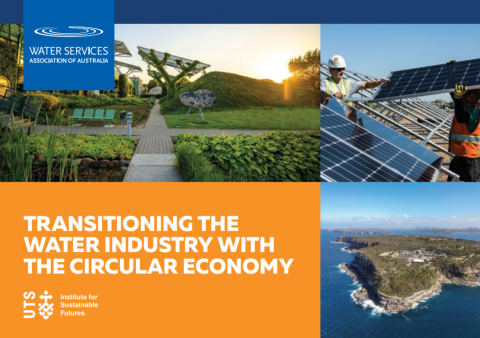Water utilities across Australia and New Zealand are embracing their role in the circular economy with the launch of a new paper from the Water Services Association of Australia (WSAA) today.

Mr Adam Lovell, Executive Director of WSAA said the water industry is well suited to meet the challenge.
“It’s hard to find a more circular business than water. All water on Earth is used and reused in an endless cycle.
“Urban water utilities manage an essential part of the water cycle that creates healthy, liveable communities and simultaneously manage a significant proportion of the waste created by those urban communities. It’s time to move beyond ‘sustaining’ to ‘restoring’ and ‘regenerative’ actions that will ensure the planets health, resilience and ability to adapt.”
The concept of the circular economy has been gaining traction locally and globally over the past decade and has many benefits for customers, the broader community, the environment and utilities.
Mr Pat McCafferty, WSAA Chair and Yarra Valley Water Managing Director said “I’m excited about the opportunities for the water sector presented by the transition with the circular economy.
“The water industry is already actively implementing opportunities including the recycling of biosolids, recycling wastewater for reuse and turning waste into energy, and using on-site renewable energy to address rising energy costs, reduce greenhouse gas emissions and meet renewable energy targets.”
The paper has been prepared for WSAA and its members by the Institute of Sustainable Futures (ISF, University of Technology Sydney).
“We are delighted to develop this timely paper for WSAA. Water as a resource, nutrient carrier and source of energy makes the water sector central to the driving of circular economy. We look forward to working with utilities to identify and embed the step changes required to deliver wellbeing for both people and planet”, said Dr Melita Jazbec, Senior Research Consultant, Institute for Sustainable Futures.
The paper outlines the key building blocks required for a utility to transition to a circular economy as well as the value proposition and the many benefits to customers and the broader community, the environment and to utilities themselves.
The paper also collates existing knowledge on the contribution of the urban water industry in a circular economy and recommends the next steps to help utilities begin or further advance their approach. It is supported by 15 international and Australian case studies showcasing the future possibilities for the urban water industry.
Download the paper HERE.
Watch a recording of the launch webinar HERE.
